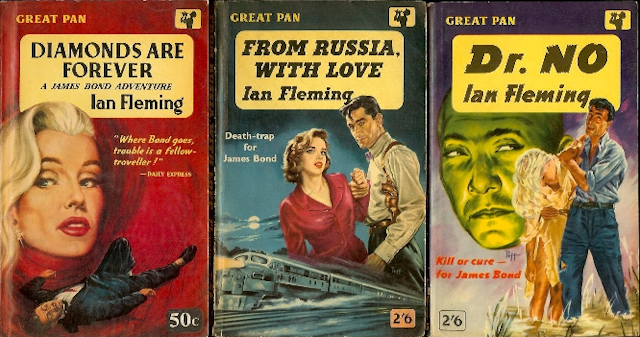Director Danny Boyle has recently said he wants to bring James Bond up to speed with “the modern world”. He was responding to a question about the impact of the current #MeToo and Time’s Up campaigns on the new Bond film due to be released in November 2019 – and the expectation that this will affect the portrayal of the obligatory “Bond Girl(s)” in the forthcoming movie.
Accusations of sexism against 007 are far from new – and far from unfounded. But in the light of rekindled feminist activism, dismissals of female agency in the Bond film franchise display a deeply conservative approach to the representation of female sexuality and oppression in the arts industry.
Take the villainous Fiona Volpe in the 1965 adaptation of Thunderball, who chastises Bond’s sexual arrogance and establishes herself as a woman to be reckoned with. In a post-coital moment she delivers this withering put down:
I forgot your ego, Mr Bond. James Bond, who only has to make love to a woman and she starts to hear heavenly choirs singing. She repents and immediately returns to the side of right and virtue. But not this one. What a blow it must have been, you having a failure.
Fiona’s pungent sarcasm is a fit riposte to Bond’s sexual innuendos and patronising attitude to women. It is her desire that threatens Bond – he previously tells her “she should be locked up in a cage” – rather than the other way around.

In GoldenEye (1995), Xenia Onatopp’s assertive sexual preferences – “Straight up, with a twist”, she says when Bond asks her how she takes it (her Vodka Martini) – mean that her satisfaction frequently comes from sadistic violence and, in particular, her ability to strangle men with her powerful thighs.
Silly names, skimpy clothing
In response to Boyle’s statements, The Daily Mail’s suggestion that “Movie spy’s women will now be written ‘with the modern world in mind’ rather than with ‘silly names and skimpy clothing’”, draws a simplistic link between the display of the female body and sexism. But to associate the display of beauty with oppression denies women any form of agency. Bond Girls do not “primarily exist to look sexy and impressed”, as Barbara Ellen suggests in The Observer. On the contrary, they dress to impress (and kill).
In a 1975 seminal study, British film scholar Laura Mulvey proposed that in classic Hollywood cinema the male gaze controls and reduces on-screen female presence to a passive object of desire. In response to this position, British Film theorist Pam Cook has argued that in Mulvey’s argument:
Display is seen as passive; it is simply a reflection of the male protagonist/spectator’s obsessive anxieties focused on the female body.
Thinking, instead, of female exhibitionism in active terms grants female actors and characters – as well as women across the world – more agency than any sartorial censorship.
Nasty books, nastier films?
Australian feminist writer Clementine Ford comments that Bond’s women “are beautiful, intelligent, often duplicitous – and all highly discardable”. But the fact that some have to die – directly or indirectly – at Bond’s hands is further proof of 007’s profound anxiety about, rather than being a dismissal of, women’s sexual emancipation.
Violence and sadism may in fact alert female spectators to the manipulative ways in which patriarchy can and does oppress women. Discussing misogyny in Hitchcock’s films, American scholar Tania Modleski argues that:
Insofar as … films repeatedly reveal the way women are oppressed in patriarchy, they allow the female spectator to feel an anger that is very different from the masochistic response imputed to her by some feminist critics.
For instance, in relation to the Bond films, in 2005 American sociologist Linda Lindsey claimed that: “In four decades of James Bond films … women are depicted enjoying rape.” Such a statement relies on a dubious notion that rape can ever be an enjoyable experience beyond the realm of sexual fantasy, and does not take into account the complexity of female desire.

Lindsey is not alone in drawing attention to the violence of the Bond cultural products. In his influential 1958 article, “Sex, snobbery and sadism”, Paul Johnson famously called Fleming’s Dr No “the nastiest book I have ever read”.
There are many uncomfortable moments in the films, too. In order to gain their insider knowledge, Bond hits Tatiana Romanova in From Russia with Love (1963) and Tracy di Vincenzo in On Her Majesty’s Secret Service (1969). Villains frequently display sadistic tendencies. Jill Masterson’s gold-coated corpse in Goldfinger (1964) is later echoed in Strawberry Fields’ body covered in crude oil in Quantum of Solace (2008). In Moonraker, Corinne is brutally killed by Hugo Drax’s dogs; in The Spy Who Loved Me, it is a shark that graphically devours Stromberg’s assistant.
Challenge misogyny
Ben Child has recently argued in The Guardian that the negotiation of the darker side of Bond “would be much easier to accept … if the dapper secret agent were not sold as the epitome of British suavity and a role model for young men”. But while the avoidance of its glorification seems crucial, the elimination of violence from the films is not.
When Skyfall was released in China and references to prostitution and torture were cut to comply with the country’s censors, it is less likely that this was done in aid of women than to hide a damaging image of Chinese treatment of human rights.
In fact, a politically correct Bond movie would be detrimental to the pursuit of gender equality. Thriller writers including Sarah Hilary and Val McDermid have recently displayed concerns about the newly launched Staunch Prize, awarded for a thriller novel not featuring any violence against women. As Sophie Hannah puts it: “Ignoring brutality may sound like a good idea but it won’t make it go away – we should challenge prejudice, not celebrate it.”
That’s exactly what the next Bond film should do.

